
An hour out of Shanghai is a town/city called Chingpu where we visited Hub's oldest uncle's grave. We were a group of 10 and we stopped by this restaurant for a delicious lunch. I was told that the prices of food here is very cheap compared to Shanghai. But it was not just the prices that were right but the food too because every dish was yummy. That was our 4th or 5th day in Shanghai and I was rather tired of banquet-type dinners and so I enjoyed this less formal meal which by my home town standard is a mighty big meal.
First came the cold dishes or appetizers as is customary in Shanghai:
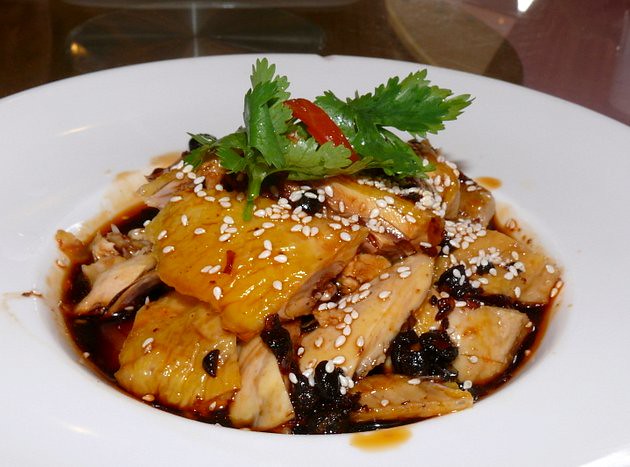
I think this was 'drool chicken' again. This doesn't mean the dish was made with drool. It means chicken so good you drool.
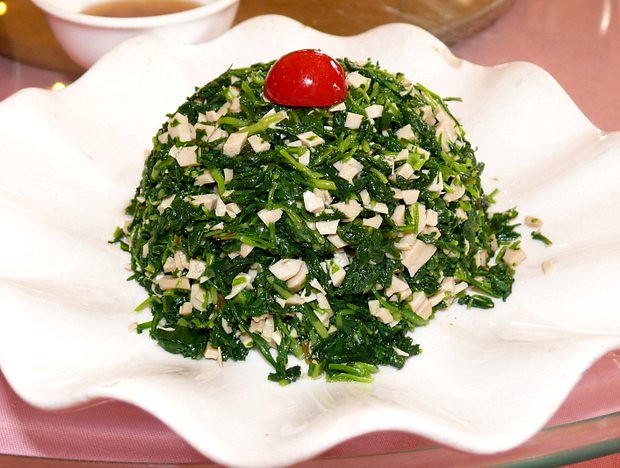
Takoo cai is a Shanghainese veg that looks like a flower. This is a salad of takoo cai with firm beancurd.
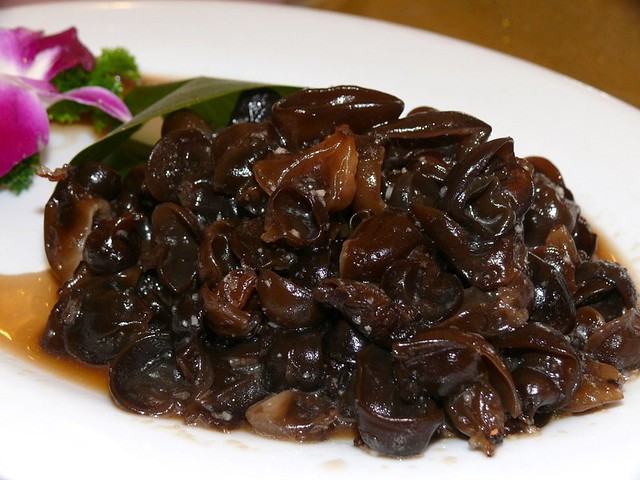
This is freshly harvested baby 'wood ears', a kind of fungus. There is another type of rare wood ears that grows naturally on the plains of Jiangxi, north of Sichuan, China. It appears in the morning like dew, is very delicate and fine and disappears as the sun gets hotter. One day I'll go to Jiangxi just to eat that elusive dish.
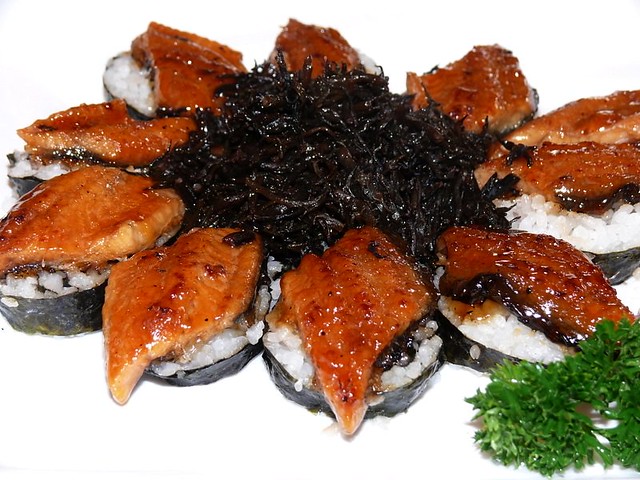
This is Chinese sushi with eel and wood ears.
Eels make me uneasy because they look like snakes but I ate one piece of this, figuring that I eat unagi (Jap eel)--although very uncomfortably--anyway. It was very tasty.
Then came the hot dishes:
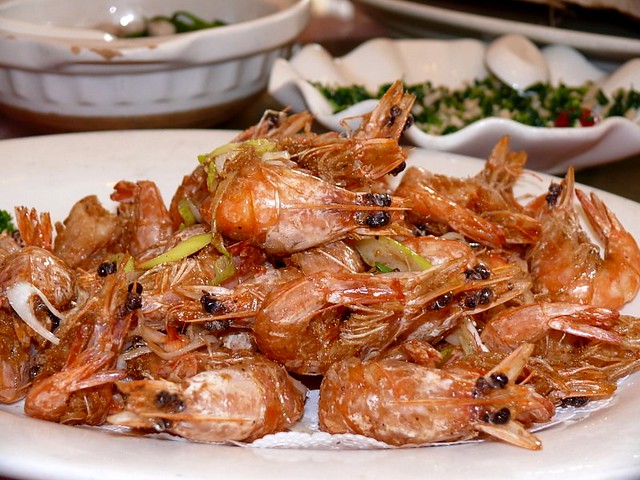
Deep-fried salted prawns.
I think it was the best dish. Some kind of prawns with a bigger upper 'body' than regular prawns. They were deep-fried and the shells were so paper-thin and crispy I ate them all without peeling. The eyes too.
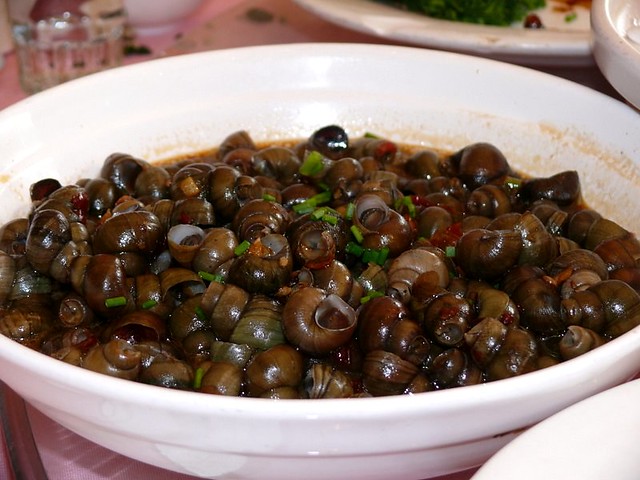
River whelks in a nice spicy beancurd sauce. I found it hard to suck the meat out and there wasn't much meat. It's one of those fun-to-eat dishes.
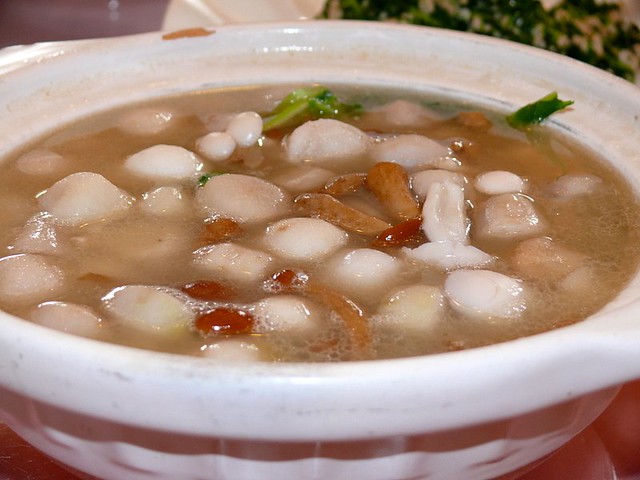
Those weren't fish balls. They are baby taro in a superior soup with mushrooms. Baby taro do not have as much flavor as the mature taro but are nice, soft and floury.
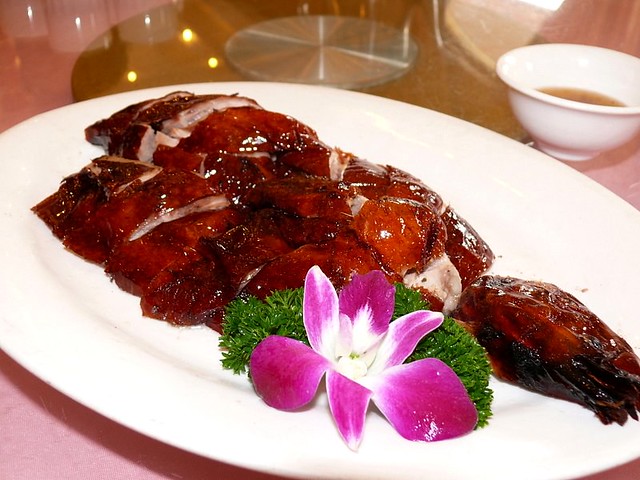
Roasted duck.
What can I say? The Chinese cook the best ducks, hands down, whether they roast them or fry them or stew them.
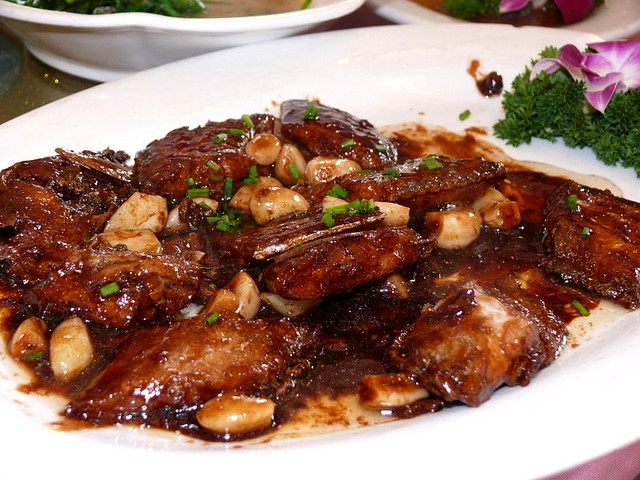
Very tender and tasty dish of dai yu (belt fish).
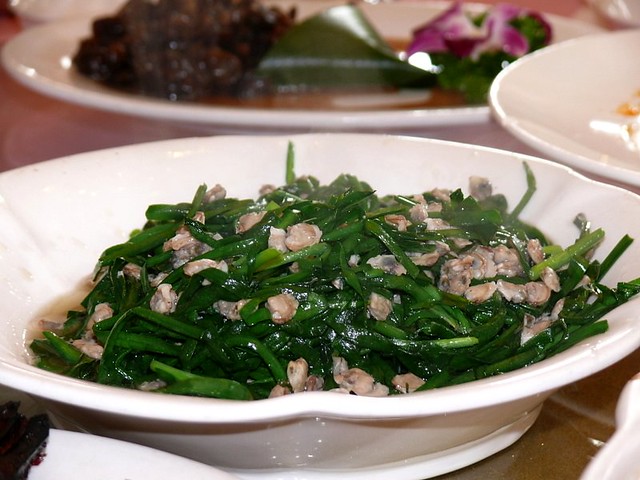
A simple but tasty dish of jiew cai (Chinese chives) and baby clams.
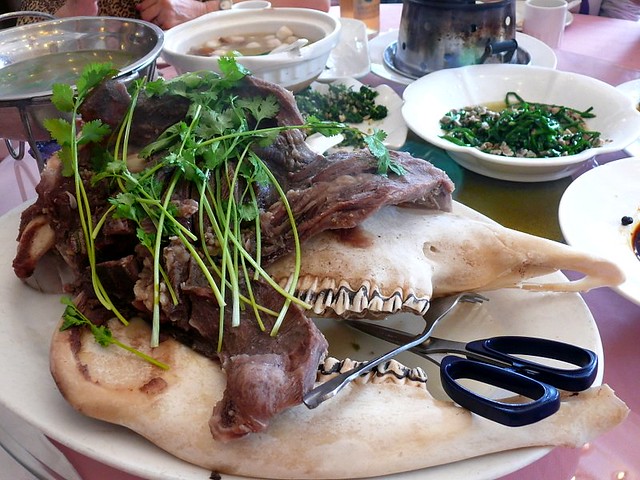
Boiled half head of cow, the weirdest dish I ate this trip.
Huiyi's hub wanted to try this the last time he was in the restaurant but there were not enough diners with him so this time he figured we can finish this dish. We couldn't, partly because some of us were put off by the cow's teeth and skull. Yes, this is half a cow's head, cooked until very tender. You snip a piece off and dip it in a tasty broth. I ate one piece just so I know how it tasted but I was rather repulsed by it.
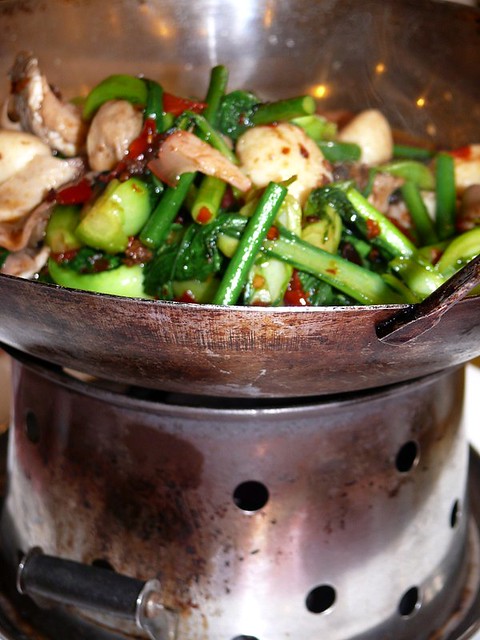
I couldn't eat anymore and I can't remember what it was.
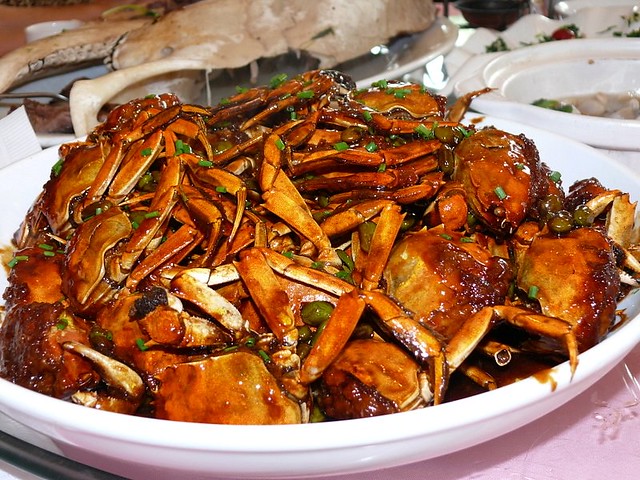
Finally, the dish we came to eat: hairy crabs, called 'mao xie' or da cha xie'.
Hairy crabs are usually steamed, plain, and eaten with a dip of black vinegar and julienned ginger. My in-laws cook any kind of crabs that way and I wondered why because the Cantonese would always cook crabs in a sauce. When I ate this dish of hairy crabs fried in a sauce with fresh soy beans, I immediately knew the answer. Like a good corn fed chicken or a good live fish, the best way to cook such quality food is by steaming or boiling briefly without adding unnecessary seasonings. This method of cooking will not rob or mask the real flavor of the food. Both Hub and I were disappointed with the saucy hairy crabs, not because they were not well-cooked. On the contrary, they were excellent. But the crabs could have been ordinary crabs and still tasted great because the sauce was good. After this dish, I realized that hairy crabs MUST be steamed plain. Any other way and the crabs are wasted.
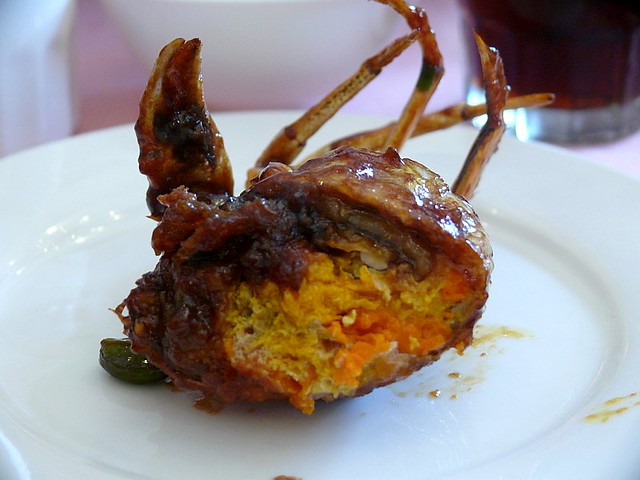
The crab was full of sweet tasty roe, which is why hairy crabs are so sought after. There isn't much meat but whatever meat that the hairy crab has is very tender and sweet.
Hairy crabs (because they have furry claws) are native to the area near the Yangcheng Lake near Suzhou in the Jiangsu Province where Shanghai is also located. The crabs are seasonal, appearing in early fall and disappearing before Spring, which is why Hub and I choose to visit Shanghai in October. I was told that hairy crabs connoisseurs eat the crabs according to the months. Even months like October and December are when female (or is it male?) hairy crabs are at their best while odd months like November and January are when the males (or females?) are best. I think the hairy crabs we had were a bit too immature because although there was plenty of roe, the flavor wasn't pronounced enough. Unlike mud crabs, the roe of the hairy crabs is soft, creamy and smooth. Each crab in the dish above was RMB29/RM15/USD4.70, considered cheap because in Shanghai and big cities they are more than double that price. Large crabs are about RMB100/RM50/USD16 to 150/75/24 each in Shanghai.
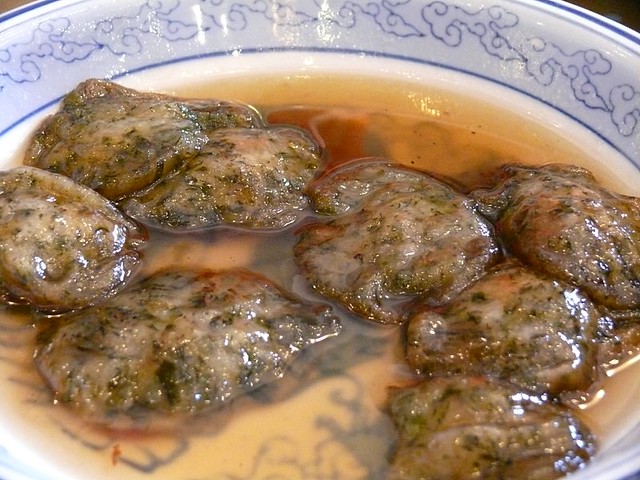
Glutinous rice pancakes with some kind of minced leaves in them in a sugary syrup, a snack considered to be too 'peasant'. I found them unusual and liked them so I ate three even though I was so full.
That was a belly-worthy meal. I was so full I felt like my eyes would pop out.

8 comments:
wow, your shanghai trip is all about food!!! i missed those chinese food...
mum, that cow's head dish is SICK. I've never seen or heard of that before; whoever came up with that dish must hv some lose screws in his head. been showing my friends that dish...i think amanda might cry if i show her what once was a soft-eyed moo moo cow!
BURP!!! BUUUUURRRRPPPPP!!! Looking at those pics make me full, the Chinese can really eat! Agree with Hong Yi, the cow's head is a BIG NO NO! YUCKS!!!
MG
The cow's head does look very scary!! I dont think I'd be able to stomach it.
I LOVE reading about all your eating adventures. NOTHING like we get here at 'ethnic' restaurants.
malaymui: u can zip back anytime
yi: yes, it was hard to take
mg: burp.
babysumo: agree
tealady: lol, it is exotic out here.
whelks. love 'em. i have only had them in black bean sauce in NYC CT. use a pick that you would use for walnuts (or a wooden toothpick) to loosen at the critter inside the shell and then suck them out, makes it real easy.
Environmentally friendly substitutes for conventional packaging materials are being produced by China Bopp pearlized film suppliers in response to a rising demand for such products. Because of their low density and ease of recycling, these films have little environmental impact and save money on shipping. Gift wrapping, flower sleeves, and artistic packaging are just a few of the many uses for these long-lasting and multipurpose materials, which make them a cost-effective and eco-friendly choice for companies concerned about their influence on the environment.
Post a Comment